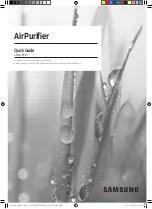
En-2
3.
Obstacles in front (blowing) only
When there is an obstacle in front of
the unit as shown in the figure, open
space above, behind, and on the
sides of the unit is required.
2.
Front (blowing) side open
As long as space indicated
in the figure is provided, it
is allowed to install the unit
where obstacles are behind
and on the sides of the unit.
(No obstacle above the unit)
FREE SPACE REQUIRED AROUND OUTDOOR UNIT
1-4. SELECTING THE INSTALLATION LOCATION
• Where it is not exposed to strong wind.
• Where airflow is good and dustless.
• Where rain or direct sunshine can be avoided as much as possible.
• Where neighbours are not annoyed by operation sound or hot air.
• Where rigid wall or support is available to prevent the increase of op-
eration sound or vibration.
• Where there is no risk of combustible gas leakage.
• When installing the unit, be sure to secure the unit legs.
• Where it is at least 3 m away from the antenna of TV set or radio. Op-
eration of the air conditioner may interfere with radio or TV reception in
areas where reception is weak. An amplifier may be required for the af
-
fected device.
• Install the unit horizontally.
• Please install it in an area not affected by snowfall or blowing snow.
In areas with heavy snow, please install a canopy, a pedestal and/or
some baffle boards.
Note:
It is advisable to make a piping loop near outdoor unit so as to reduce
vibration transmitted from there.
500 or more
200 or more
350 or more
00 or more
1.
Obstacles above
When there is no obstacle in front
and on the sides of the unit, it is al-
lowed to install the unit where an
obstacle is above the unit only if the
space shown in the figure is provided.
00 or more
500 or more
00 or more
Service space
350 or more
350 or more
6.
Service space
Provide space for service and maintenance as shown in the figure.
500 or more
00 or more
• When installing the unit in an area that is enclosed with walls such
as a verandah, be sure to have enough space as shown below.
In this case, the air conditioning capacity and power consumption
might deteriorate.
• When there is a lack of airflow or there is a possibility of becoming
short cycle, install an outlet guide and make sure there is enough
space behind of the unit.
• When installing two or more units, do not install the units in front or
behind each other.
00 or more
200 or more
350 or more
500 or more
500 or more
(Unit: mm)
5.
Obstacles in front, behind and on side(s)
4.
Obstacles in front and behind
The unit can be used by at-
taching an optional outdoor
blowing guide (MAC-856SG)
(but both sides and top are
open).
00 or more
500 or more
Blowing guide (MAC-856SG)
Height of the obstacle is 200 or less
1-3. SELECTING OPTIONAL DIFFERENT-DIAMETER JOINTS
If the diameter of connection pipe does not match the port size of outdoor unit, use optional different-diameter joints according to the following table.
Port size of outdoor unit
Optional different-diameter joints (port size of outdoor unit
→
diameter of connection pipe)
MXZ-
4D80VA
MXZ-
5D00VA
Liquid / Gas
6.35 (/4)
→
9.52 (3/8) : PAC-493PI
9.52 (3/8)
→
2.7 (/2) : MAC-A454JP
9.52 (3/8)
→
5.88 (5/8) : PAC-SG76RJ
2.7 (/2)
→
9.52 (3/8) : MAC-A455JP
2.7 (/2)
→
5.88 (5/8) : MAC-A456JP
Refer to the installation manual of indoor unit for the diameter of connection pipe of indoor unit.
A UNIT
6.35 (/4) / 2.7 (/2)
B - D UNIT B - E UNIT
6.35 (/4) / 9.52 (3/8)
(Unit: mm (inch))
Note:
When operating the air conditioner in low outside temperature, be sure
to follow the instructions described below.
• Never install the outdoor unit in a place where its air inlet/outlet side
may be exposed directly to wind.
• To prevent exposure to wind, install the outdoor unit with its air inlet
side facing the wall.
• To prevent exposure to wind, it is recommended to install a baffle
board on the air outlet side of the outdoor unit.
Avoid the following places for installation where air conditioner trouble
is liable to occur.
• Where flammable gas could leak.
• Where there is much machine oil.
• Where oil is splashed or where the area is filled with oily smoke (such
as cooking areas and factories, in which the properties of plastic
could be changed and damaged).
• Salty places such as the seaside.
• Where sulfide gas is generated such as a hot spring.
• Where there is high-frequency or wireless equipment.
• Where there is emission of high levels of VOCs, including phthalate
compounds, formaldehyde, etc., which may cause chemical crack-
ing.
BH79A024H01_en.indd 2
2014/01/21 13:46:45


























